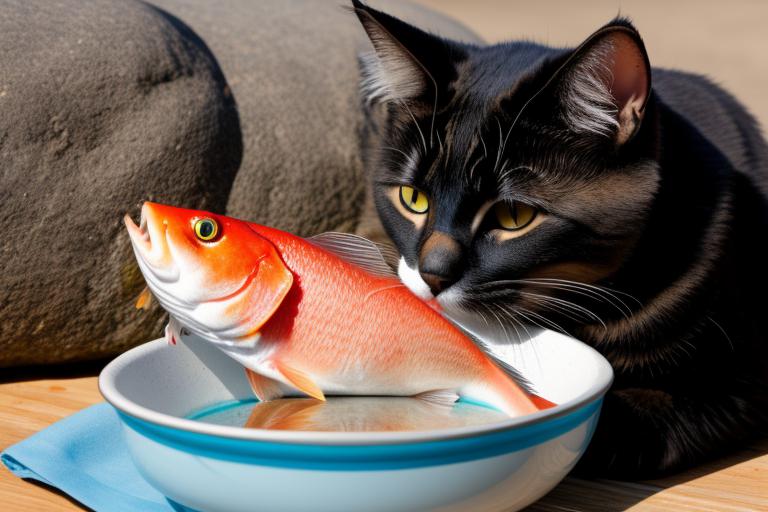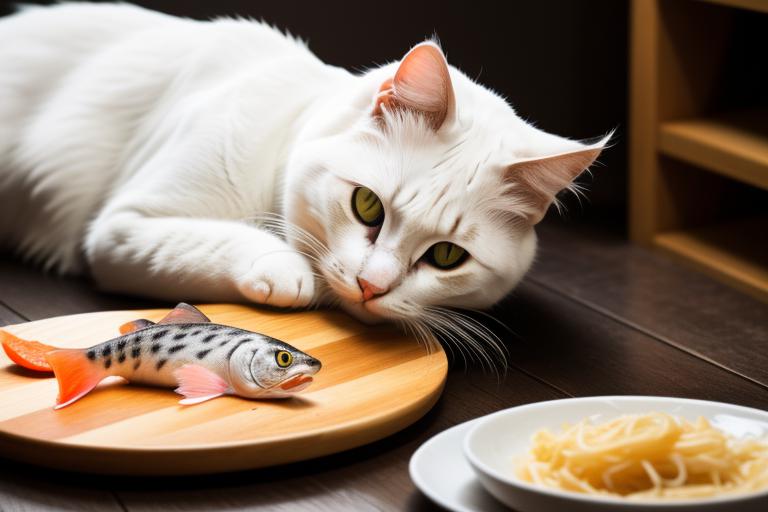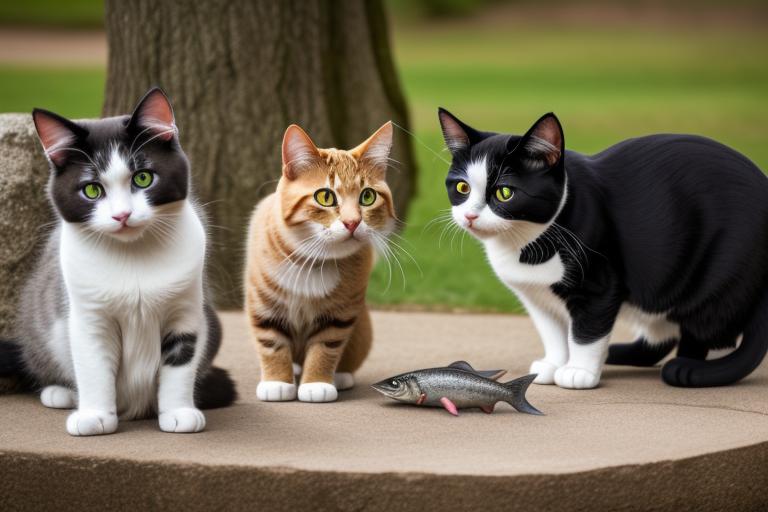Are you curious to know if cats can eat fish? Well, let’s just say that fish is like the holy grail for our feline friends. It’s as if they were born with an innate desire for those slippery, scaly creatures.
But before you go ahead and start feeding your cat a steady diet of fish, there are a few things you need to know. So, grab a seat and get ready to explore the world of cats and fish. It’s a fascinating journey that will unravel the mysteries of what cats can and cannot eat.
Nutritional Benefits of Fish for Cats

Cats can greatly benefit from consuming fish due to its rich nutritional content. Fish is a great source of protein, which is essential for your cat’s overall health and well-being. Protein helps to build and repair tissues, support a healthy immune system, and promote muscle growth. Additionally, fish is rich in omega-3 fatty acids, which are important for your cat’s skin and coat health. These fatty acids can help to reduce inflammation and improve the condition of your cat’s skin, making their fur shiny and healthy.
Fish also provides essential vitamins and minerals that are important for your cat’s overall health. It’s a good source of vitamin D, which helps with calcium absorption and bone health. Fish also contains important minerals like magnesium, potassium, and selenium, which are necessary for various bodily functions. These nutrients contribute to your cat’s overall well-being and support their immune system.
However, it’s important to note that fish shouldn’t be the sole source of nutrition for your cat. It’s recommended to feed them a balanced diet that includes a variety of protein sources. Additionally, certain types of fish, such as tuna, can be high in mercury, so it’s important to feed fish in moderation.
Potential Risks of Feeding Fish to Cats
Before you start feeding fish to your cat, it’s important to be aware of the potential risks involved.
Cats can have allergic reactions to fish, which can lead to symptoms like vomiting, diarrhea, and skin irritations.
Additionally, fish can contain high levels of mercury, which can be toxic to cats if consumed in large amounts.
Lastly, feeding fish as the sole source of nutrition can lead to nutritional imbalances, as fish alone may not provide all the necessary nutrients your cat needs.
Allergic Reactions in Cats
Feeding fish to your feline friend can potentially lead to allergic reactions. Although fish is often considered a staple in a cat’s diet, it’s important to be aware of the potential risks it can pose.
Just like humans, cats can develop allergies to certain foods, including fish. Allergic reactions in cats can manifest in various ways, such as itching, redness, swelling, or gastrointestinal issues. Some cats may even experience difficulty breathing or develop a rash.
If you notice any of these symptoms after feeding your cat fish, it’s crucial to consult with your veterinarian. They can help determine if your cat is indeed allergic to fish and provide guidance on alternative dietary options that will keep your feline friend healthy and allergy-free.
Mercury Poisoning Risks
If you feed your feline friend fish, it’s important to be aware of the potential risks of mercury poisoning. While fish can be a great source of protein and omega-3 fatty acids for cats, it’s crucial to consider the following points to ensure their safety:
- Mercury Levels: Fish, especially larger species like tuna and swordfish, can contain high levels of mercury. This toxic metal can accumulate in a cat’s body over time and lead to serious health issues.
- Neurological Problems: Mercury poisoning can affect a cat’s nervous system, causing symptoms such as tremors, weakness, and difficulty walking. In severe cases, it can even lead to seizures or paralysis.
- Kidney Damage: Cats are particularly susceptible to kidney damage from mercury exposure. This can result in decreased kidney function and potential long-term health complications.
To protect your furry friend, it’s advisable to limit their fish intake and choose low-mercury options. Consulting with your veterinarian can help you make informed decisions about your cat’s diet and minimize the risk of mercury poisoning.
Nutritional Imbalances
To ensure your cat’s nutritional balance, it’s important to consider the potential risks of feeding them fish.
While fish can be a good source of protein and omega-3 fatty acids for cats, it shouldn’t be the sole component of their diet.
Feeding your cat excessive amounts of fish can lead to nutritional imbalances. Fish is low in calcium and high in phosphorus, which can disrupt the delicate balance of these minerals in your cat’s body. This can potentially lead to urinary tract problems, such as the formation of bladder stones.
Additionally, fish lacks certain essential nutrients that cats need, such as taurine and vitamin E.
Therefore, it’s crucial to provide a balanced diet that includes a variety of protein sources to meet your cat’s nutritional needs.
Types of Fish Safe for Cats to Eat
Certain types of fish are safe for cats to eat. When it comes to feeding your feline friend fish, it’s important to choose the right ones that aren’t only safe but also beneficial for their health. Here are three types of fish that you can safely include in your cat’s diet:
- Salmon: Rich in omega-3 fatty acids, salmon provides numerous health benefits for cats. Omega-3 fatty acids help maintain healthy skin and coat, promote brain development, and support a strong immune system. However, it’s crucial to cook the salmon thoroughly to eliminate any potential parasites.
- Tuna: Tuna is another fish that cats enjoy, and it’s safe for them in moderation. It contains high levels of protein and essential nutrients like vitamin D and selenium. However, it’s important to note that tuna should be given as an occasional treat due to its high mercury content. Excessive consumption of tuna can lead to mercury poisoning.
- Whitefish: Whitefish, such as cod or haddock, is a lean source of protein that can be beneficial for your cat’s overall health. It’s low in fat and rich in vitamins and minerals. Ensure that the whitefish is cooked thoroughly to eliminate any potential bacteria or parasites.
How to Prepare Fish for Your Cat
To prepare fish for your cat, start by ensuring that it’s fresh and free of any bones or skin. Cats can be sensitive to bones, which can pose a choking hazard, and the skin may cause digestive issues.
When selecting fish, choose options like salmon, tuna, or whitefish, as these are safe and nutritious for cats. Once you have the fish, wash it thoroughly to remove any bacteria or parasites.
Next, you can cook the fish by boiling, baking, or steaming it. Avoid adding any seasoning, as cats are sensitive to certain spices and flavorings. After cooking, let the fish cool down before serving it to your cat.
It’s important to remember that fish should only make up a small portion of your cat’s diet and should be given as an occasional treat rather than a regular meal.
Feeding Guidelines for Fish in a Cat’s Diet

When incorporating fish into your cat’s diet, it’s important to follow feeding guidelines to ensure their health and well-being. Here are three key guidelines to consider:
- Balance is key: While fish can be a great source of protein and omega-3 fatty acids for your cat, it shouldn’t be the sole component of their diet. Cats require a balanced diet with a variety of nutrients from different sources. So, make sure to include other protein sources, such as poultry or beef, as well as carbohydrates and essential vitamins and minerals.
- Cook the fish thoroughly: Raw fish may contain parasites or bacteria that can be harmful to your cat’s health. To avoid any potential risks, it’s recommended to cook the fish thoroughly before feeding it to your feline friend. Steaming, baking, or boiling the fish can help eliminate any harmful pathogens while retaining its nutritional value.
- Moderation is key: While fish can be a tasty treat for your cat, it should be given in moderation. Too much fish in your cat’s diet can lead to an imbalance in nutrients, such as excessive intake of mercury or other environmental contaminants. Aim for a balanced approach and consult with your veterinarian to determine the appropriate amount of fish to include in your cat’s diet.
Alternatives to Fish in a Cat’s Diet
If you’re looking for alternatives to fish in your cat’s diet, there are several options that can provide the necessary nutrients for their health and well-being.
One alternative is poultry, such as chicken or turkey. These meats are rich in protein and can be easily digestible for cats. You can feed your cat cooked, boneless poultry, making sure to remove any skin or seasoning.
Another option is beef or lamb, which also offer high-quality protein. Just like with poultry, make sure to remove any bones and fat before feeding it to your cat.
Additionally, you can consider introducing eggs into your cat’s diet. Eggs are a great source of protein and can be served scrambled or boiled.
It’s important to remember that when introducing new foods to your cat, you should do it gradually and monitor for any signs of allergies or digestive issues.
If you’re unsure about what alternatives to fish would be best for your cat, it’s always a good idea to consult with your veterinarian for personalized recommendations.
Frequently Asked Questions
Yes, cats can eat canned fish, but in moderation. Fish can be a good source of protein and omega-3 fatty acids for your furry friend, but too much can lead to nutritional imbalances.
If your cat shows signs of fish poisoning, such as vomiting, diarrhea, or difficulty breathing, it’s important to seek immediate veterinary care. Fish poisoning can be serious, so don’t hesitate to get help.
Yes, there are some fish that can be toxic to cats. It’s important to avoid feeding your cat raw fish, especially certain types like tuna and salmon, as they can cause health issues.
Yes, cats can eat raw fish. However, it is important to remove any bones and ensure the fish is fresh and properly prepared. Raw fish can contain bacteria or parasites that may be harmful to cats.
You should include fish in your cat’s diet occasionally, as a treat or supplement. However, it should not be the main staple of their diet. Consult with your veterinarian for specific dietary recommendations.
Conclusion
In conclusion, feeding fish to cats can provide them with nutritional benefits, but it’s important to be aware of potential risks and to choose the right types of fish.
When preparing fish for your cat, make sure to remove all bones and cook it thoroughly.
Additionally, it’s essential to follow feeding guidelines and consider alternatives to fish in a cat’s diet for a balanced and healthy meal plan.

